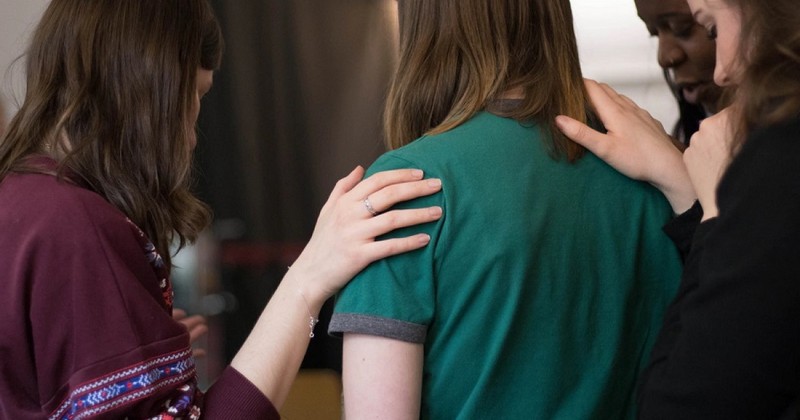What does group addiction treatment consist of?

This is how group therapy helps to overcome addictive disorders.
Addictions are among the most widespread psychological pathologies among the population, to the point that the abuse of certain substances with addictive potential is very normalized (despite their harmful consequences for physical and mental health).
Fortunately, however, research in Clinical Psychology and Health Sciences has made it possible to develop valuable and very versatile therapeutic resources to help those who suffer from these disorders. Moreover, much of the effectiveness and flexibility of these forms of intervention with patients is due to the fact that nowadays addiction treatment is not seen as something that must always involve working with addicts as individual entities, but also involves other people.
In this article we are going to see what one of these therapy approaches consists of in which there is the participation of several people: the group treatment of addictions.
Overcoming an addiction is not an individual process
The addictions have as part of their causes modifications in the nervous system; changes in the brain that have been induced by the consumption of certain drug or by the repeated accomplishment of an addictive behavior (for example, to bet money to the machines "slot machines".
These transformations of some structures of the nervous system make the person much more predisposed to continue feeding this addiction (or even to develop other new addictions in parallel), and at the same time participate in the appearance of the withdrawal syndrome: when the person goes longer than usual without satiating the addiction, he/she quickly begins to feel very bad, and may even suffer psychiatric symptoms of varying severity.
However, beyond the biomedical side of addiction, there is also a psychosocial side.. The addicted person not only suffers from organic alterations generated by the pathology (tremors when going for a long time without using, increased sensitivity to stimuli, etc.), but also builds a way of living, thinking and feeling that contributes to addiction. For example, it is very common for people with a deep-rooted addiction to direct their social life towards interaction with other people who are also addicted, leaving friendships, family relationships, etc., in the background.
This social and contextual element, the activities, people and environments to which the person is exposed, participate in the maintenance of the addiction... but that means that it is also possible to help the person who wants to overcome his or her disease through this pathway..
This is why, over the last few decades, therapeutic intervention processes have been emerging in patients that go beyond the individual. For example, through what is known as the therapeutic community, the patient is encouraged to become involved in a dynamic of activities carried out collectively and in mutual support in an open and inclusive space of people with similar problems.
But in this article we are going to focus on a specific context of therapeutic intervention based on groups: group psychotherapy to help people with addictions.
The 5 keys to addiction treatment.
These are the characteristics of group addiction treatment that make this intervention modality an effective resource for leaving behind drug dependence or addictive-type behavior.
1. Participants motivate each other
The human component of group therapy sessions should not be forgotten.It is easier to find people who are sympathetic to those suffering from addiction, and empathy is generated. From this empathy arises the desire for the group therapy partner to come out of his or her addiction, and this is reflected in the way in which the participants relate to each other.
2. Patients have theoretical and practical information at their disposal
In group therapy applied to addictions, a lot of valuable information flows about how to face this pathology. This information is provided both by the therapists and by the rest of the participants, who contribute with their own point of view.who contribute their experiential point of view.
3. A therapeutic experience full of memorable moments is generated, which are "anchored" in the person's memory.
Much of the effectiveness of the different forms of therapy has to do with their ability to attract the person's attention to themselves at key moments, so that they behave in a way that is consistent with what they have learned in their daily lives.
As it is done in a group, group therapy gives rise to many moments that are fixed.a result in many moments that remain fixed in the memory of the participants.It is an experience rich in nuances and in which one interacts with several people, each with his or her own history and identity. Thanks to this, many situations that patients will experience in their daily lives will evoke memories of what happened in previous sessions.
4. The expectation of talking about oneself in front of several people motivates not to relapse
Having made the commitment to overcome the addiction in front of several people, the degree of motivation with the therapeutic process and overcoming this pathology increases..
Patients are less exposed to the temptation to give in to the drug or addictive behavior because it is only a "personal decision", and they also begin to think about the interests of the community of which they are a part and the image they project in it.
5. Each person has multiple examples to draw inspiration from
Finally, it should not be forgotten that group therapy is also a place where you can find role modelspeople who, by their history or their attitude, make other patients feel identified with them and see first hand that it is possible to get out of addiction.
Are you interested in having therapeutic support to overcome an addiction?
If you are looking for therapy services to overcome addictions, contact our team of psychology professionals.
At Psychologists Majadahonda we attend people of all ages and we attend presecially and also online.
(Updated at Apr 12 / 2024)